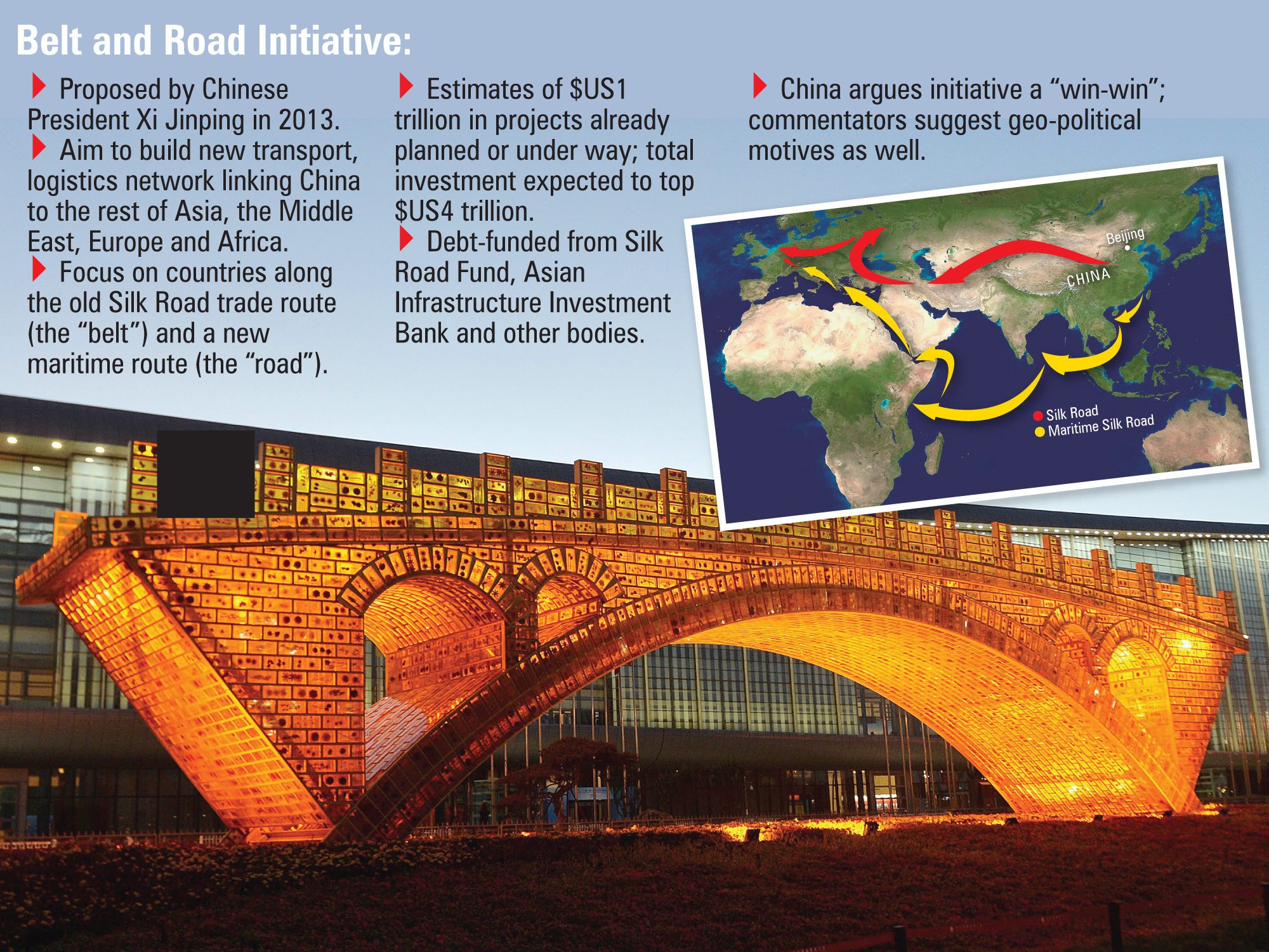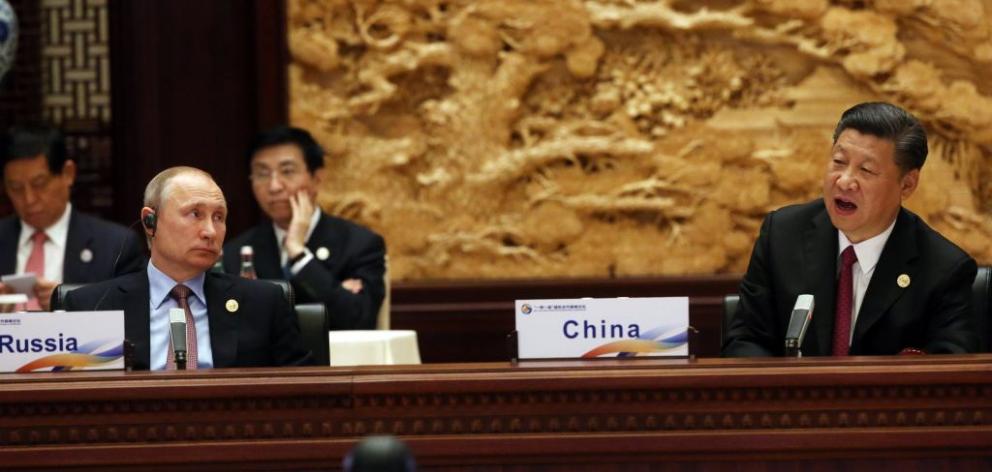
The old Silk Road trade routes are being reimagined as China pumps billions of dollars into a new international network of motorways, ports and railways to promote world trade.
But, as questions linger about the Asian giant’s ambitions, New Zealand will not escape the impact. Chris Morris reports.
For centuries, the Silk Road was used by caravans of horses to carry treasures between China and the rest of the world.

The ancient trade routes linked Asia, the Middle East, Africa and Europe by land and sea, helping fuel the rise of civilisations in China and other countries.
Fast-forward to the present and China is trying to reboot the concept - this time by investing billions in a new transport and logistics network stretching across continents and oceans, from Beijing to Europe.
And even thousands of kilometres away, off the beaten track at the bottom of the world, New Zealand is not immune.
The ambitious project, dubbed the Belt and Road Initiative, envisaged a new network of motorways, railways, ports, pipelines and other improvements along the routes, designed to accelerate the movement of goods.
The "belt'' would take goods overland, while the"road'' crossed the world's oceans, and a host of policy reforms - such as streamlined customs rules and free trade agreements - would reduce other trade barriers.
And at the heart of it all would sit China, offering loans to build projects and positioning itself as a new Asian hub for world trade.
It was a vision first unveiled by Chinese president Xi Jinping in 2013, but expanded at the latest Belt and Road Forum in Beijing earlier this month, which ODT Insight attended.
In front of 28 other world leaders, including Russia's Vladimir Putin and Turkey's Tayyip Erdogan, Mr Xi unveiled another $US124 billion in funding for projects to progress the initiative.
And he extended a hand to countries not along the routes, such as New Zealand, by saying they too could join the"big family'' and be involved.
It was an offer that caught the attention of New Zealand's official delegation to the forum, led by Science and Innovation Minister Paul Goldsmith.
Mr Goldsmith, speaking at New Zealand's embassy in Beijing, told ODT Insight China's plan was"a statement of outward-looking globalism'' and its impact could be "colossal''.
And even though New Zealand was not positioned along either route, "we obviously want to be part of the discussion'', he said.
"The purpose of me being here is obviously an indication that we want to be in the room.''

The plan has also been noted back in New Zealand, where Prime Minister Bill English and Chinese Premier Li Keqiang signed an agreement to explore ways New Zealand could participate earlier this year.
It was also being watched in Dunedin, where Otago Chamber of Commerce chief executive Dougal McGowan said exporters shipping goods to China and elsewhere could benefit.
"It has the potential to change the way people think about their exporting and trading routes. It's going to open up a whole lot of new opportunities and potential markets throughout the world, really.''
China was already New Zealand's second-largest trading partner, as imports and exports have soared since the two countries' free trade agreement was signed in 2008.
But top New Zealand brands such as Fonterra or Dunedin's Silver Fern Farms could be among those to benefit from more efficient, easier-to-use transport infrastructure in future, he said.
That could reduce the time and expense of exporting to China, and allow companies to use China as a hub to reach further inland or to other countries along the Belt and Road, he said.
China's investment in other countries could also lift more people out of poverty, potentially creating new export markets for New Zealand firms in other countries, he predicted.
One example of Belt and Road's game-changing potential was a new railway freight service stretching from Beijing to London, launched in January, which took just 18 days to cross Asia and Europe and reach the United Kingdom.
That compared favourably with container vessels plying the world's oceans and gave exporters a new option for reaching countries along the rail corridor, he said.
But it was also just the start, Mr McGowan predicted.
"I think we're only just starting to see the tip of the iceberg, but what it does is it starts to create a different hub for where that infrastructure comes and goes from. It comes and goes out of China.''

The Belt and Road Initiative received warm praise from among the 28 other leaders who attended the Beijing forum earlier this month, including because it offered developing countries a path out of poverty.
But other countries stayed away or opted to send lower-level delegations instead, amid concerns about geopolitical ambitions underpinning China's economic plans.
In New Zealand, the prospect of Chinese investment has prompted fresh fears, including from NZ First leader Winston Peters, of rising Chinese influence and imported labourers taking Kiwi jobs.

In 2015, Guoxin International Development Company announced it would invest $3 billion in Christchurch's post-earthquake rebuild, although confirmed projects are yet to eventuate.
And in March, media reports suggested China Rail wanted to invest in upgrading Northland's road and rail infrastructure, although a touted memorandum of understanding deal is also yet to be unveiled.
But in any case, New Zealanders should not expect major infrastructure investment here as a result of Belt and Road, Simon Draper, the executive director of the Asia New Zealand Foundation, said.
While some countries could see vast investment in infrastructure, that was not likely in New Zealand, he told ODT Insight while in Beijing.
Instead, the benefits to New Zealand were likely to come through tackling some of trade's logistical challenges, such as aligning customs processes and other policies, he said.
New Zealand firms with specialist skills could also get involved in other ways, for example by offering expertise in environmental protection to China and other countries, he said.
The Belt and Road Initiative was also a way for China to"really announce itself as a global superpower'' and could play a significant part in reshaping the world over the next 50 years, he said.
"This is more than just about roads and bridges ... the world axis is tilting and [Belt and Road] could be a significant part of that.''
But that did not make the initiative a"zero-sum game'' for other countries, such as New Zealand, whose economies and prosperity were increasingly linked to China's.
"It is possible for China to win and for us to win. A prosperous, outward-looking Asia is good for New Zealand ... It's a good thing for us, so we should want them to succeed.''
THE ACADEMIC'S VIEW

China is emerging as a champion of globalisation as the United States turns in on itself under President Donald Trump, Prof Robert Patman says.
Prof Patman, an international relations expert at the University of Otago, told ODT Insight the Belt and Road Initiative was an attempt by China to maintain the "phenomenal'' growth it had enjoyed since the 1980s.
That growth rate had slowed from an average of between 8% and 13% since the 1980s, to about 6.5% in the last year, he said.
China wanted to reverse that trend, but also position itself at the "top table'' of the world economy - a desire which should come as no surprise, Prof Patman said.
"China has just grown so dramatically in economic terms in the last three decades. It's lifted more than 400 million people out of poverty, which is an incredible achievement by any measure.
"It believes it has earned its right to be there,'' he said.
The initiative would deliver economic benefits to other countries, which was "ultimately . . . a good thing'', but also raised some "big questions'' for China and the rest of the world, he said.
That included whether China would wield more power and influence in countries that accepted Chinese investment, he said. It also included whether China could continue down a path of opening up economically, while maintaining a one-party political system.
"It could have unintended consequences for China,'' Prof Patman said.
THE MAYOR'S VIEW

The Belt and Road Initiative could help cities like Dunedin avoid "bureaucratic entanglements'' in China, and also boost relations between countries, Mayor Dave Cull says.
Dunedin already enjoyed strong and growing ties with parts of China, including Shanghai, Qingyuan and Guangzhou.
That had helped foster educational exchanges and other links between institutions in Dunedin and China, benefiting the University of Otago, Otago Polytechnic and the city's schools, he said.
Dunedin's cultural sector had also benefited, an example being the launch of a multimedia exhibition in Shanghai earlier this month featuring Dunedin artists and designers.
The Belt and Road Initiative was in part a framework that offered a mechanism for countries to agree on the way forward, including more "people-to-people'' exchanges, and he believed that was important, Mr Cull said.
The signing of formal agreements were an important part of any relationship with China, as they spelt out "exactly where you are'', and the Chinese expected them to be held to. "They mean what they say.''
Encouraging those sorts of people exchanges was lucrative for Dunedin's education institutions and also could also help boost tourism, he said. "We're getting to know people and getting them to know what we're about and where we're from, and they're attracted to visit.''
THE MINISTER'S VIEW

New Zealand wants a seat at the table as China's Belt and Road Initiative gathers pace, Science and Innovation Minister Paul Goldsmith says.
Mr Goldsmith headed a small New Zealand delegation attending this month's forum in Beijing, and said the country had a stake in China's plan.
New Zealand had an interest in any initiative designed to encourage open economies, removal of barriers and free trade, even if it was not directly in the path of the Belt and Road.
"The more they focus on things that make it easier for goods and services to move, it is obviously something we're interested in as a trading nation, so we're encouraging of it.''
New Zealand had signed an agreement with China to explore ways of participating in the Belt and Road Initiative over the next 18 months, he said.
But he was less willing to be drawn over concerns geopolitical ambitions could be behind China's economic vision, saying only New Zealand tried to trade effectively with all countries.
"We, I think, as a country, have learnt the lesson of being totally dependent on one country. People will read into it [China's motives] whatever they want to ... I don't think we need to over-analyse it.''
CHINA'S VIEW

The Belt and Road Initiative will bring about "common prosperity'', Chinese president Xi Jinping says.
Mr Xi, speaking to world leaders at this month's Belt and Road Forum in Beijing, said the initiative aimed to tackle "deep-seated problems'' in global development.
"Global economic growth is not on solid ground. International trade and investment are sluggish. Economic globalisation is encountering some headwinds.
"Development has become more uneven, not to mention the other challenges that overshadow the world economy, like wars, conflicts, terrorism and a massive flow of refugees and migrants,'' he said.
Countries needed to work together to tackle such problems to increase economic returns in an environment of peace and economic stability, which the Belt and Road would rely on, he said.
But that would only happen with extensive consultation and co-operation to build new infrastructure and align policies, he said.
The results promised to deliver "win-win'' returns for all countries, and it was not about forcing China's vision on other countries, he said.
"We have no intention to interfere in other countries' internal affairs, export our own social system and model of development, or impose our own will on others.
"The Belt and Road Initiative originates in China but belongs to the world,'' he said.
• Chris Morris travelled to Beijing with assistance from the Chinese consulate-general in Christchurch.












